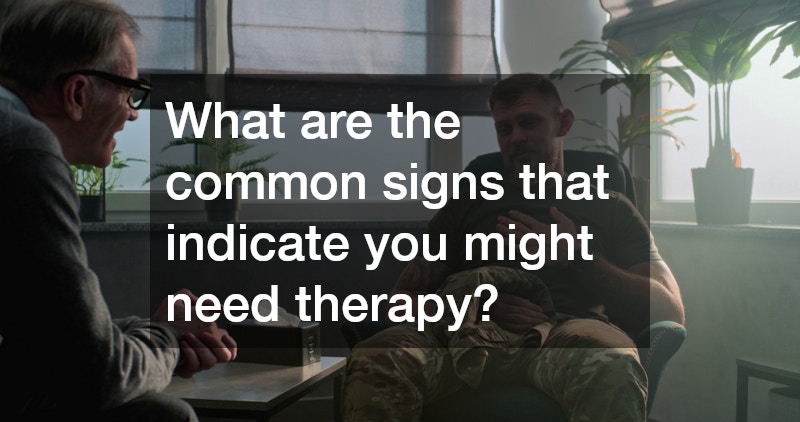The increasing importance of mental health awareness cannot be overstated in today’s fast-paced world. More people are beginning to realize that mental wellbeing is a crucial aspect of overall health, just as important as physical wellness. Therapy serves as a vital tool in maintaining mental health by offering support and strategies to deal with various psychological issues. Recognizing the signs that indicate the need for therapy is crucial in taking proactive steps towards a healthier life.
What are the common signs that indicate you might need therapy?
Enduring feelings of sadness can significantly impact your daily life, making even the simplest tasks feel monumental. When such feelings persist over time, they might signal underlying issues that require professional intervention. Therapy provides a safe space to explore these emotions and work towards resolving the root causes, preventing further decline in mental health.
Persistent sadness is not just about feeling blue; it can manifest as a lack of interest or pleasure in activities once enjoyed. This emotional despondency can lead to feelings of hopelessness, making one feel trapped in their circumstances. A therapist can help navigate these complex emotions and offer insights into how to restore a sense of hope and purpose.
Therapists are trained to recognize patterns that could indicate depression or other mood disorders. By engaging in therapy, individuals are given the tools to understand and manage these feelings effectively. It is important to realize that seeking help is a positive action, one that can lead to substantial improvements in overall wellbeing.
Changes in appetite or sleep can be significant indicators of underlying psychological issues. Whether it’s sudden weight gain or loss, insomnia, or excessive sleeping, these physical symptoms can reflect emotional turmoil. Therapy plays a crucial role in addressing these symptoms by exploring their psychological origins.
The changes in appetite or sleep patterns often go overlooked, dismissed as temporary issues. However, when they persist, it is essential to consider them as signals of deeper mental health concerns. Acknowledging these signs and seeking therapy is a proactive step towards recovery and sustained health.
How can therapy improve your mental health?
Therapy provides an opportunity to gain a fresh perspective on existing problems, which can be incredibly liberating. By discussing thoughts and feelings with a professional, individuals can uncover new insights that were previously obscured. Therapists offer objective viewpoints that help in reframing negative thinking patterns.
Through this reframing, individuals can challenge irrational beliefs and reduce their impact on mental wellbeing. This cognitive shift encourages more balanced and positive thinking, leading to better emotional health. The clarity gained from therapy often results in improved relationships and functioning in personal and professional life.
Moreover, gaining a new perspective through therapy fosters self-awareness and understanding. This newfound awareness equips individuals to make informed decisions about their actions and behavior. By altering entrenched thought patterns, therapy enhances personal growth and mental resilience.
What are the different types of therapy available?
Cognitive Behavioral Therapy (CBT) is a widely utilized approach that focuses on identifying and changing negative thought patterns. It is grounded in the concept that our thoughts impact our behaviors and emotions. By restructuring these patterns, CBT aims to improve emotional wellbeing and overall mental health.
This type of therapy is goal-oriented and often involves homework assignments to practice skills between sessions. CBT is effective for a range of issues, including depression, anxiety, and phobias. Participants in CBT learn to challenge distorted thinking and replace it with more realistic, constructive thoughts.
One of the key advantages of CBT is its structured nature, which makes it a practical choice for many. As a shorter-term therapy, it provides tangible benefits relatively quickly. The skills learned in CBT are versatile, offering lasting benefits that extend beyond the therapy period.
Therapists working in this modality help individuals gain insight into their patterns and dynamics, facilitating personal growth. Through exploring the psyche, clients can understand the motivations driving their behavior and address unresolved issues. This can lead to significant emotional release and healing, promoting long-term change.
While psychodynamic therapy is typically longer-term, it offers profound insights that can lead to lasting transformation. It encourages exploring deeply entrenched thoughts and feelings, often leading to greater emotional freedom. The profound self-exploration facilitated by this therapy contributes to a deeper sense of self and interpersonal relationships.
Recognizing the need for therapy and its importance in enhancing mental health can be transformative. Therapy provides many benefits, from gaining new perspectives to developing resilience and healthy coping mechanisms. Seeking professional help is not a sign of weakness; rather, it is a proactive step towards achieving overall wellbeing and a more fulfilling life.




